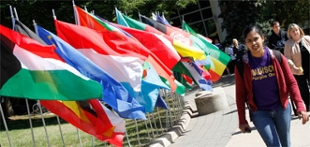International Week to shed light on Middle East
JMU News
To many Americans, the Middle East is a collection of war-torn, oil-rich nations that have become a staple on the evening news. But those who have studied and lived in the region paint a different picture, one that is not easily identifiable from a geographic, political, cultural or religious perspective.
So what, exactly, is the Middle East? That question will be explored in depth during International Week at JMU, Sept. 26-29. The event features panel discussions on the region as well as cultural exchanges designed to educate, entertain and enlighten both the university community and the general public.
The term “Middle East” — sometimes referred to as the “Near East” to distinguish it from the “Far East” countries of Asia — dates to the late 1800s, when the competing British and Russian empires used it to describe the area between Arabia and India. The label has carried over into the early 21st century, but remains somewhat ambiguous as a point of reference, says Dr. Karim Altaii, professor of integrated science and technology at JMU and a panelist during International Week. Scholars and even officials within the U.S. State Department disagree on a map of the Middle East, he says. While the region generally refers to the countries of Iraq, Kuwait, Saudi Arabia, United Arab Emirates, Syria, Jordan, Lebanon, Israel, Oman and Yemen, it sometimes is expanded to include North African nations along the Mediterranean Sea as well as Iran, Pakistan and Afghanistan. “It all depends on your viewpoint and your interests,” Altaii says.
The Middle East may best be defined by its people, who, despite their many differences, share a long and storied history, Altaii says. “If you look at the area around the Mediterranean, there are so many commonalities in their food, in their dances, in their music. And for centuries, there has been so much trade and interaction between them — going back to before there were borders — that goes beyond the highlights of history, of wars and of killing.”
“Life in the Middle East is not only about religion or politics,” adds Jawan Shir, a native of Afghanistan and JMU graduate student in history who will moderate the Sept. 28 panel “The Middle East Through Our Eyes.” “It’s about drinking coffee and watching movies, having a family conversation or playing soccer. All of these things happen there — perhaps in a different fashion than here in America, but they are a part of daily life.”
Many facets of Middle Eastern life will be on display during the week, which kicks off Sept. 26 with an international bazaar on The Commons and continues with events centered on music, cooking, women’s issues and entertainment. Dr. Eric M. Davis, professor of political science at Rutgers University and past director of the university’s Center for Middle Eastern Studies, will give the keynote address on Sept. 27 at 7 p.m. The schedule also features a six-team public debate, hosted by the Madison Debate Society, on the question of social media, youth and change in the Middle East, as well as a showing of the groundbreaking documentary film “Reel Bad Arabs,” which explores Hollywood’s history of degrading images of Arabs.
As long as crude oil remains a world commodity, the U.S., which wants to control the flow of that oil, particularly to emerging markets like China, will be a key player in the Middle East, Altaii says. But America must be vigilant about its standing among the people of the region, who are often lost in the headlines, he says. “We’re all citizens of this world, and if we don’t have that commonality, we’re going to continue to be involved in wars that we cannot afford. We’re going to be sacrificing blood and our economy to create more enemies.”
Above all, the goal of “What is the Middle East?” is to shed light on a region of the world often mischaracterized by the West.
“We live at a time in human history where we need each other more than ever before,” Shir says. “There is room for mutual respect and understanding, through scholarship, through diplomacy. We just need to take advantage of that.”
Related links:
JMU Faculty Share Adult Literacy Strategies with Colleagues in Iraq
Dr. Altaii’s webpage, School of Integrated Sciences

